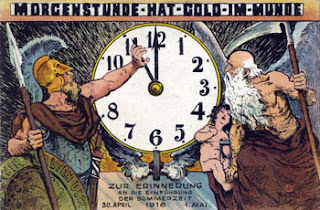Get your hoe ready! I hope everyone is enjoying their extra hour of sleep this week following the weekend's 'fall back' for Daylight Savings Time. I thought it might be interesting to discuss how the concept of moving the clocks forward and back has connections to both World Wars. A few weeks ago, we talked about how Winston Churchill had a perfect quote for just about everything, and his description of Daylight Savings Time sums it up with poetic charm:
"An extra yawn one morning in the springtime, an extra snooze one night in the autumn... We borrow an hour one night in April; we pay it back with golden interest five months later."
Since the Beginning of Time Itself
The idea of DST existed long before it was actually implemented around 100 years ago. It is known that ancient civilizations practiced a similar concept where they would adjust their daily schedules according to the Sun.
Power to the People
Throughout history, the idea of conserving daylight was suggested by multiple famous scientists with varied responses. In 1784, American inventor and politician Benjamin Franklin penned an essay titled "An Economical Project for Diminishing the Cost of Light" to the editor of The Journal of Paris. In it, he jokingly suggested that Parisians could economize on their use of candles by getting people out of bed earlier to make use of the natural light.
A major contribution to modern DST came from New Zealand entomologist George Vernon Hudson in 1895. In a paper presented to the Wellington Philosophical Society, he proposed a two-hour shift forward in October and a two-hour shift back in March (seasons are opposite in the two hemispheres). He followed this up with an article in 1898 but despite some interest, the idea never caught on.
British builder William Willett proposed an introduction of DST independently from Hudson in 1905. His suggestion was to turn the clocks ahead 20 minutes on each of the four Sundays in April, and switching them back by the same amount on each of the four Sundays in September. This plan caught the attention of Member of Parliament Robert Pearce, who introduced a bill to the House of Commons in February 1908. The first Daylight Saving Bill was drafted in 1909 and repeatedly presented to Parliament, but since it was opposed by many including farmers, it was never made into a law. Willett died in 1915 before he could see his idea come to life.
 |
| William Willett |
The first country to implement DST was Germany, during the First World War. Clocks were first turned forward at 11:00pm on April 30, 1916 with the rationale being the minimization of artificial light in order to conserve fuel for the war effort. Britain and many other countries soon followed suit, including the U.S. After the war was over, many countries reverted back to standard time.
 |
| "Morgenstunde hat Gold im Munde"-- The German equivalent of "The early bird gets the worm" |
 |
| A British advertisement for the setting back of the clocks in September |
From February 9, 1942 to September 30, 1945, year-round DST or "War Time" was in force in America during the Second World War. The change went into effect only 40 days after the bombing of Pearl Harbor, and after the war ended the U.S. time zones were re-named "Peace Time". In Britain, "Double Summer Time" was adopted by setting the clocks two hours ahead of GMT in the summer and one hour ahead during the winter.
Contemporary Continuation
From 1945 to 1966, DST caused major confusion and craziness in the U.S. for trains, buses, and broadcasting because states and localities were free to choose when and if they observed DST. Congress's Uniform Time Act of 1966 put an end to that and stated DST would begin on the last Sunday of April and end on the last Sunday of October. Since then, there have been numerous changes and updates as recent as 2005.
Hopefully this post sheds some light on this interesting event on our calendars. Shoutout to timeanddate.com for the info! How do you feel about DST? Should we still be observing this system? Let me know what you think!
Before I sign off I'd just like to encourage everyone to see your local Legion members for a poppy during the poppy campaign, and pin it on your left side as close as possible to your heart! Please, please don't stick it on your hat or purse strap or alter it in any way! I hope I'm preaching to the choir on that one!
Thanks for reading,
Delany




No comments:
Post a Comment